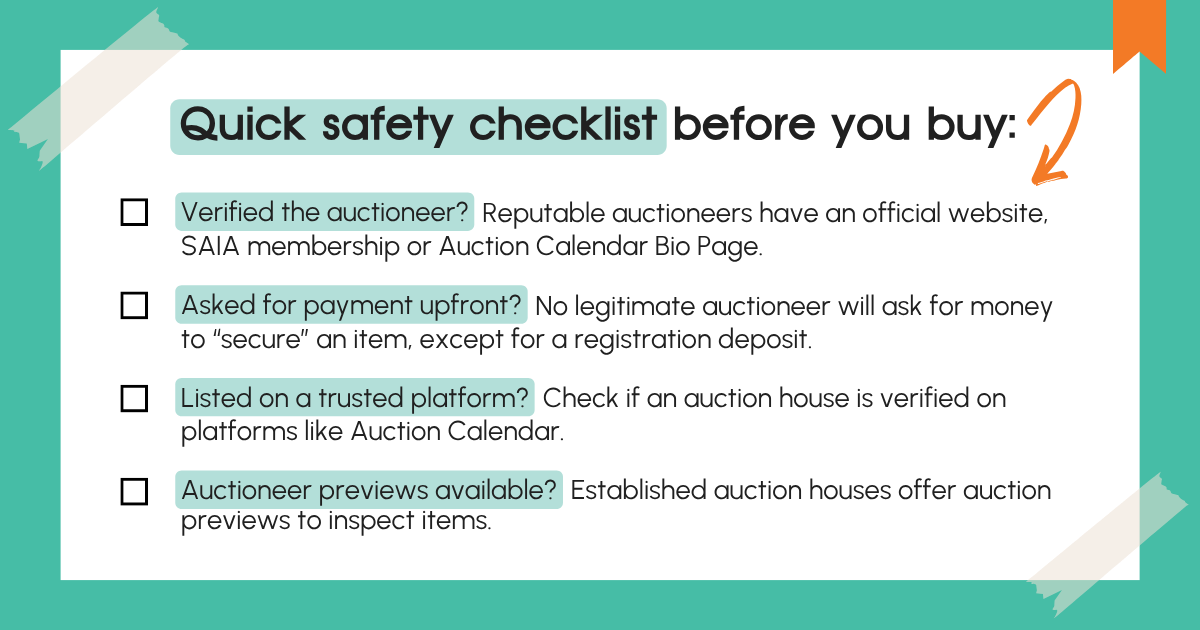
Blog Updated: 5 August 2025
More and more people are taking advantage of the tremendous benefits on-site and online auctions provide. However, the influx of interest in auctions is marred by a familiar foe, namely scams. As technology has evolved, so have the scams, becoming more elaborate as the years progress.
While vigilance and caution are two words you should always practice when attending both online and on-site auctions, here are a few tips you can utilise to help you avoid scams.
What is auction fraud?
Auction fraud refers to deceptive practices that occur during the process of buying or selling items through auctions, whether they are conducted online or in-person. There are many ways fraudsters can take advantage of unwitting buyers, including misrepresentation of goods on auction, fraudulent bidding, or non-delivery of items purchased at auction.
Misrepresentation: The item/s shown in an auction or via an auction listing website is not what is delivered to the buyer. It can be misleading in terms of the description, quality or condition of the product.
Non-Delivery: Non-delivery involves selling an item and intentionally not delivering the product to the buyer. This scammer will make off with the entire value of the product without ever fulfilling their contractual agreement.
Shill Bidding: This is when a seller or his agent intentionally places fake bids on their auction items to manipulate the final sale price of their product. They do this through the use of multiple fake accounts.
Triangulation: Auction triangulation is an online scheme involving three parties: the scammer, the victim, and an unsuspecting third party. The scammer poses as the seller offering a product and gets paid by the real customer. However, the scammer uses a stolen credit card to place the order from the real online shop, with the items delivered to the buyer. Once the cardholder realises they’ve been a victim of fraud, they file a reversal in order to get their money back.
Common Auction Scams To Watch Out For
Auctions are a great place to snag a good deal, but there are scrupulous characters out there who are all-to-eager to take advantage of those seeking a good deal.
The “Pay Before Auction” Scam
If you've found an auction you’re eager to attend, you’ve contacted the “auctioneer,” and they're offering to sell it now if you pay upfront, this is a scam. Fraudsters will often sell expensive cars or other items at unbelievably low prices, but to secure this too-good-to-be-true deal, you’ll have to make a payment for them to take it off the auction list.
Why It’s a Scam: A reputable auctioneer will never ask for payment upfront in order for you to bypass the bidding process. However, you are required to pay a deposit upon registration, which is refunded if you do not place the winning bid.
Key Tip: No matter which kind of auction you’re attending, never pay for something you haven’t viewed in person. Auction houses often hold auction previews, allowing you to view and inspect the auction items in person.
The “Pretend To Be An Auctioneer” Trap
Be aware of fraudulent pages on Facebook Marketplace or other social media platforms. A good way to determine if it’s fraudulent is to verify the contact information. Check the physical address, landline or company email (make sure it’s not Gmail or Yahoo). If there are no links to their website or other official pages, this can be another red flag. This, coupled with poor quality content that includes spelling mistakes and low-res photos, can provide additional clues.
Visual manipulation is another tactic buyers need to watch out for, as fraudulent auctioneers have become more advanced in their scams, adding image editing skills to their resumes. For example, there have been cases where an auctioneer has uploaded digitally altered images of their premises to Google Business listings, enhancing the visuals to appear more professional. To ensure you don’t fall victim to this scam, it’s always a good idea to cross reference business listings with other social media platforms. If you’re still unsure, use reliable platforms like Auction Calendar to verify an auctioneer’s information.
While SAIA membership certificates are a clear sign an auctioneer is legitimate, scammers appear to be one step ahead. Unfortunately, fraudsters now appear to be falsely claiming SAIA membership certificates from auction house websites as their own.
Key Tip: If you suspect fraudulent activity, ensure you verify the auctioneer’s official information. Auction Calendar offers a Bio Page from reliable auction houses, which allows you to verify information. If you suspect an auction house may be falsely claiming to have SAIA membership, it’s always a good idea to get in touch with SAIA or allow Auction Calendar to assist.
Stay ahead of the scammers with the following tips to help you avoid these auction scams:
Do your research
Research is paramount in the auction world, helping you save money and avoid scams. Do your due diligence and ensure that the auctioneer is registered with the required bodies such as PPRA when selling real estate. Auction listing websites will provide the information of the auctioneer, which you can use to conduct thorough research beforehand. Don’t forget to check their website, email them, or contact them via telephone to verify their legitimacy. Auction Calendar provides you with the convenient option of contacting auctioneers directly. This can be a great tool to use if you have any questions for the auctioneer, which will allow you to feel comfortable before you part with your money.
Is it too good to be true?
The old saying, “If it’s too good to be true, it probably is,” should always be at the back of your mind when browsing upcoming auctions. If you suspect something is “too good to be true,” do your research on the market value of the item. Ask the seller questions and ask for additional information or images to confirm your suspicions.
“Pre-auction sales” happen, but be weary
First, take the time to thoroughly research the auctioneer and the items up for auction. Knowing the auctioneer's reputation and track record can give you valuable insights into the legitimacy of the event. Moreover, researching the items themselves enables you to make informed decisions and set appropriate bidding limits. If you opt to take part in pre-auction sales, it’s important you remember that your initial offer might be used as an opening bid, potentially influencing the trajectory of the bidding process. Be mindful of this as you determine your starting bid, ensuring it aligns with your valuation of the item.
While the thrill of an auction can be enticing, it's vital to remember that all the regular auction rules apply. Vigilance remains key. Buyers should prioritize gathering comprehensive and accurate information about the items, their condition, provenance, and any associated costs. This diligence ensures that you're making bids based on solid information, minimizing the risk of unexpected surprises.
Read the terms & conditions
Auctioneers will always provide the Terms and Conditions of the sale before an auction. This not only protects the seller but also protects the purchaser. Buyers also have the opportunity to request a thorough breakdown of the additional costs that go beyond the winning bid amount. Ensure you read all necessary information, including payment details, when payment is due and shipping policy, to help you understand all the costs involved. Sometimes, hidden fees can be written into the Terms and Conditions, and you’d be none the wiser until it’s time to pay.
Additional tips to keep in mind
-
- Always be aware of the Voetstoots clause. The Voetstoots Clause, also known as an “as is” clause, is a legal provision commonly used in contracts of sale for property or goods. When signing a contract with a Voetstoots Clause, the purchaser is acknowledging the defects of the property or goods and is purchasing at their own risk.
- Never pay money over to the seller unless you have physically inspected the goods and you are happy with the condition.
- Always check the company’s contact details (email, landline, website, etc) to ensure you’re working with the actual and legitimate company.
- The only deposit required is the one needed upon registration. An auctioneer will never ask you for a deposit to view items.
- Depending on the items presented for auction, the auctioneer may find it necessary to request the buyer's signature on a Non-Disclosure Agreement (NDA).
- For select, exclusive auction items, the auctioneer may require prospective buyers to undergo a pre-qualification process.
- Ask for an invoice with a letterhead and company details as well as a reference number should you need to make a payment. Always do what you can to verify company and banking details.
- If you are unsure, SAIA has provided a list of companies that are known for performing scams. You can view the list here.
- When attending a vehicle auction for repossessed cars, it is possible to verify whether your preferred car is up for auction via the financial institution’s website. Attractive starting prices or opening bids are one way to reel novice buyers in
- If you’re still unsure about an auction or have additional questions, Auction Calendar allows you to contact auctioneers directly to help provide clarity.
- All auctioneers on Auction Calendar are vetted, giving you peace of mind that every listed auction house is legitimate
When in Doubt, Check With Us
Whether you’re attending an on-site or online auction, it’s essential you're always vigilant to help you avoid fraud. If you come across auctions that you suspect are untrustworthy or suspicious, report them immediately. This can help create a safer auction environment while helping others avoid falling victim to fraudulent activity.
Auction Calendar is committed to ensuring users enjoy a safe and user-friendly experience while browsing the range of auctions we have available on our platform. If you suspect an upcoming auction may be fraudulent, do not hesitate to send us a message via support@auctioncalendar.co.za
Save our nifty anti-scammer checlist for later! 👇

Related Articles
10 Auction terms to know before heading to first auction

Tips for buying farming equipment on auction

How the internet has changed the auction industry


